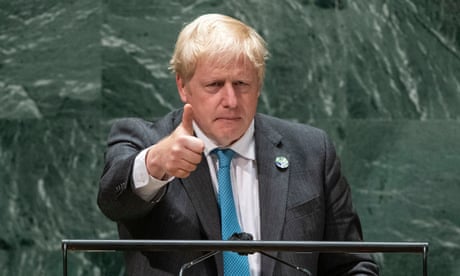The climate crisis has made the idea of a better future impossible to imagine | Ian Jack
This is what I think is wicked about Alarmist, they have terrified a whole generation. @FriendsOScience @DawnTJ90 @ClimateDepot @ccdeditor @ClimateCatastr3https://t.co/1LG6evdACh— Starbuck (@Starbuck3201) September 26, 2021
https://www.theguardian.com/commentisfree/2021/sep/25/climate-crisis-future-emergency
By Ian Jack
Writing in 2003, the American environmentalist Bill McKibben observed that although “some small percentage” of scientists, diplomats and activists had known for 15 years that the Earth was facing a disastrous change, their knowledge had almost completely failed to alarm anyone else.
It certainly alarmed McKibben: in June 1988, the scientist James Hansen testified to the US Congress that the world was warming rapidly and human behaviour was the primary cause – the first loud and unequivocal warning of the climate crisis to come – and before the next year was out, McKibben had published The End of Nature, the first book about climate change for a lay audience. But few others seemed particularly worried. “People think about ‘global warming’ in the way they think about ‘violence on television’ or ‘growing trade deficits’, as a marginal concern to them, if a concern at all,” he wrote in 2003. “Hardly anyone has fear in their guts.”
McKibben’s words appeared in the literary magazine Granta, which I then edited, in a piece I’d commissioned for an issue on global warming: This Overheating World. It seemed a timely and important theme, but sometimes editors can get too far ahead of the game. Many thousands of people across the world felt more and knew more about the climate crisis than I did, but few of them, unfortunately, appeared to be literary novelists or writers of narrative non-fiction. The issue included some fine pieces but was not a total success. In fact, Margaret Atwood did publish a novel that year, Oryx and Crake, set in a world ruined by climate breakdown (among other causes), but the most prominent examples of its fictional treatment, the small genre sometimes known as “cli-fi”, had still to come. Cormac McCarthy’s The Road, published in 2006, may never be surpassed, not even by the Book of Revelation, as the future’s most terrifying herald.
…
It would be wrong, however, to confine the blame for our delayed engagement to straightforward denialism. Recognising climate breakdown as a possibly terminal crisis for civilisation led to the difficulty of managing it inside our heads. As David Runciman, professor of politics at Cambridge University, wrote six years ago: “It’s hard to come up with a good analogy for climate change but that doesn’t stop people from trying. We seem to want some way of framing the problem that makes a decent outcome look less unlikely than it often appears.” He listed the most common analogies: climate was a “moonshot problem”, a “war mobilisation problem”, a “disease eradication problem”. Beyond giving a notion of the effort required, none worked; war, for instance, needed a clear enemy in view – and in the climate crisis, Runciman wrote, “the enemy is us”. Analogies offered a false comfort: “Just because we did all those things doesn’t mean we can do this one.”

Climate breakdown is like nothing that has gone before. Like an intermittent fountain, its ghastly prospect shoots high in the air one minute and then vanishes as though it had never been. On 9 August this year the Intergovernmental Panel on Climate Change published a report that spread alarm and despondency everywhere. “A code red for humanity,” warned the UN secretary general. “The alarm bells are deafening, and the evidence is irrefutable: greenhouse gas emissions … are choking our planet and putting billions of people at immediate risk.” By 11 August, A-level results, Brexit lorry queues and Prince Andrew had squeezed the message from every front page.
An ordinary kind of life goes on. Research shows that in 2020 the word “cake” was mentioned 10 times more often on UK television shows than the phrase “climate change’”, and that “banana bread” was heard more frequently than “wind power” and “solar power” combined. Research shows that four in 10 young people around the world are hesitant to have children, while three-quarters of them find the future frightening and more than half believe humanity is doomed. Research (by the climate scientists James Dyke, Robert Watson and Wolfgang Knorr) shows that if humanity had acted on Hansen’s testimony immediately to stop the accelerating use of fossil fuels and begun a decarbonisation process of around 2% a year, then we would now have a two-in-three chance of limiting warming to 1.5C. If that calculation is correct, the odds these days must be quite a lot longer.
Is there fear in our guts? Boris Johnson spoke to the UN assembly on Wednesday like a boy who wanted the applause of the Oxford Union. He had a clever reference (Sophocles), a popular reference (The Muppet Show), and a reference to a particular kind of English life (“unlocking the drinks cabinet”) that vanished with the Austin Allegro. It seems unlikely that the world can be saved by such a speech, but there is no point complaining. For this dangerous moment, he is what we have.


